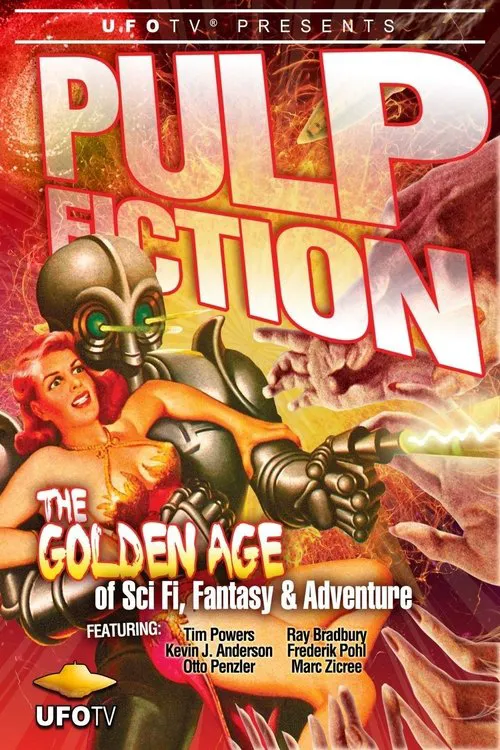Pulp Fiction: The Golden Age of Storytelling

Plot
Pulp Fiction: The Golden Age of Storytelling profiles the lives and works of a group of renowned writers from the 1920s to the 1940s, a time period that would come to be known as the "Golden Age" of pulp fiction. This era gave birth to some of the most iconic and enduring characters in cinematic history, and their stories have had a profound influence on the film industry to this day. The documentary delves into the lives of these writers, examining their creative processes, the challenges they faced, and the enduring impact of their work. The film opens by showcasing the works of Dashiell Hammett, an author often credited with defining the hard-boiled detective genre. Hammett's stories, such as "The Maltese Falcon" and "Red Harvest", introduced audiences to a gritty, no-nonsense world of crime and corruption. His protagonist, the iconic private investigator Sam Spade, would go on to influence generations of detectives to come. The documentary explores Hammett's complex and often tumultuous life, including his struggles with addiction and his eventual disillusionment with the Hollywood system. Next, the film shifts its focus to the works of Raymond Chandler, another key figure in the development of the hard-boiled genre. Chandler's novels, such as "The Big Sleep" and "Farewell, My Lovely", offered a darker, more cynical vision of Los Angeles and its inhabitants. His protagonist, Philip Marlowe, was a brooding, hard-drinking detective with a penchant for getting entangled in complex webs of crime and deceit. The documentary highlights Chandler's own personal struggles, including his battles with depression and his tumultuous relationships. Throughout the film, there are also profiles of other influential writers from the Pulp Fiction era, including Cornell Woolrich, who is credited with inventing the "film noir" genre, and James M. Cain, whose novels, such as "Double Indemnity" and "The Postman Always Rings Twice", are renowned for their dark, pulpy sensuality. Woolrich's contributions to the genre were often ignored in his lifetime, but the documentary shines a light on his innovative and influential work. Cain, on the other hand, was a master of crafting plots that were both suspenseful and melodramatic, often featuring morally ambiguous characters and situations. One of the most fascinating aspects of the documentary is its exploration of the impact of pulp fiction on the film industry. As the film industry grew and became more sophisticated, Hollywood began to draw on the rich pool of story ideas and characters from the pulp fiction era. Many of the most iconic films of the 1930s and 1940s, such as "The Thin Man" and "The Mask of Dimitrios", were adaptations of pulp fiction novels. In fact, it's estimated that 90-95% of the top blockbusters in Hollywood movies from this era were based on stories from the pulp fiction era. The documentary also examines the role of pulp fiction in shaping the way audiences engage with crime and violence on film. The Pulp Fiction era coincided with the introduction of sound in films, and the resulting shift in cinematic style and content helped to create a new kind of movie-going experience. Audiences were drawn to films that offered them a vicarious thrill, a chance to live out their fantasies of crime and danger. Pulp fiction stories often featured gritty, intense depictions of violence and crime, which had a profound impact on the evolution of the film industry. Throughout the documentary, there are interviews with a range of scholars, critics, and industry professionals, providing valuable insights into the legacy of the Pulp Fiction era. From Martin Scorsese to Quentin Tarantino, many of the most influential filmmakers of our time have cited pulp fiction as a key influence on their work. The documentary highlights the enduring impact of this era on popular culture, from the gritty, crime-fueled worlds of "The Godfather" to the stylized, high-concept storytelling of Tarantino's "Pulp Fiction". Ultimately, "Pulp Fiction: The Golden Age of Storytelling" is a fascinating exploration of a pivotal moment in cinematic history. The documentary shines a light on a group of talented writers who helped shape the film industry and created some of the most enduring characters and stories in popular culture. Their legacy continues to influence filmmakers today, and this documentary is a rich tribute to their enduring power and innovation.
Reviews
Recommendations


